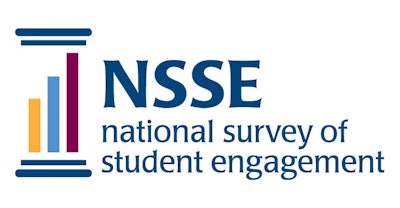A topical module around inclusiveness and engagement with cultural diversity debuted in this year’s NSSE survey, and the results prompted discussions around teaching practices. 
Every year since 2000, the National Survey of Student Engagement (NSSE) has conducted annual surveys around the undergraduate experience which produce data that helps colleges and universities improve student learning and success. The surveys include topical modules on things such as academic advising, learning with technology and experiences with writing.
The NSSE’s annual report titled “Engagement Insights: Survey Findings on the Quality of Undergraduate Education” released this week included responses to a new set of questions on inclusiveness and engagement with cultural diversity. There are also new insights into issues impacting LGBQ+ and gender-variant students.
For the 2017 survey, 630 U.S. bachelor’s degree-granting institutions participated, with questions being given to first-year and senior students. Of those, 132 institutions elected to answer the new module, which included questions about how much coursework emphasized issues such as cultural norms and biases and learning from other cultures.
“This was a natural extension of some of the core survey items that have been part of the survey for a long time,” said Dr. Jillian Kinzie, associate director of the Center for Postsecondary Research at Indiana University School of Education. “Good educational practice suggests that when students encounter diversity—whether that’s diverse ideas or people who have views that are very different than theirs—it deepens their learning.”
Kinzie added, “This expansion of items came out of a desire to dig deeper around inclusive teaching practices and to try and better understand the institution’s commitment to diversity.”
The findings noted that students in courses with more inclusive practices reported greater learning and engagement. About three in five college students said their courses emphasized sharing their own perspectives and experiences and/or respecting the expression of diverse ideas. Students in courses with more inclusive classroom practices reported engaging in more reflective and integrative learning and feeling a greater sense of institutional support.
Kinzie said NSSE is able to analyze the results of different ethnic and racial groups and compare the data, which provides insights. The results can be leveraged into effectively exploring the topic and taking action.
“These are really challenging conversations to have on campus about inclusive teaching practices,” said Kinzie. “If we start with the value it brings, that can help ease into these challenging conversations. It’s difficult for faculty to really get their heads around this and in some cases alter their teaching practices to ensure that they are practicing more inclusive kinds of teaching.”
Bringing in diversity officers and student affairs staff and having them work with faculty, creates informative dialogue, she said. By example, Kinzie said staff at African American culture centers on large campuses have significant expertise, but are often only brought into discussions reactively, not proactively.
“These results allow us to come around the table and bring all the players who have expertise on our campuses to have conversations about how we can change the environment and ensure that coursework emphasizes diverse and inclusive practices,” Kinzie said.
Other noteworthy findings included LGBQ+ students being more engaged than their straight peers in reflective and integrative learning activities. Gender-variant first-year students rated their interactions with administrative staff and offices lower than their interactions with fellow students.
NSSE changed its questions this year to include gender-variant students and required institutions to ask about sexual orientation. These were previously opt-in questions, with the decision made by the institution.
“We thought that was disrespectful of students who want to say who they are, and we ought to allow them the opportunity to express that on the survey,” said Kinzie. “We got some push-back . . . It was important for us to take a stand on ensuring that those items are represented to respect students.
“Just as we know that students of color have different experiences, women have different experiences, students who are low-income—all of these other characteristics influence the quality of students’ experience. We need to ensure that we examine those same kinds of factors when we’re thinking about the quality of the undergraduate experience for students who identify as a gender other than man or woman and who have a sexual orientation other than straight.”





















